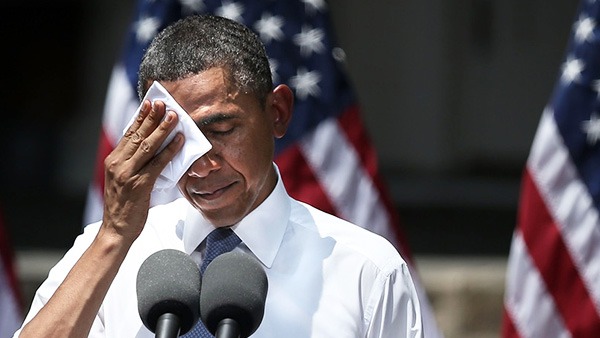(Source: National Review)
One of the more enviable political skills Republicans possess is the ability to sell their policies and ideas to the public even when those ideas directly contradict any notion of reality or good sense. They relentlessly insist the sky is red until voters believe them and Democrats are too intimidated to speak up and point out that it’s actually blue.
That dynamic has played out as congressional Democrats, crippled with panic, reacted to the admittedly horrendous rollout of the Affordable Care Act by offering shallow political “fixes” that would only undermine the law. The ACA, no matter where you stand on it, is a very carefully constructed Jenga puzzle of policy. All the layers are interwoven, and if Congress or the White House begins to pick apart certain provisions out of political fear, the entire thing could collapse.
| Democrats run around with their hair on fire apologizing instead of pointing to the good things the ACA has already achieved—a law that offers a dramatic improvement to the health insurance market and will have long-term benefits. |
Last week, 39 House Democrats broke with the White House and supported a bill introduced by GOP Congressman Fred Upton that would pretty much gut the core of the ACA and its exchange system, and allow some people to re-enroll in their cancelled, sub-standard plans. But there’s a reason these plans were cancelled in the first place—they didn’t meet basic standards of consumer protection or efficiency.
Republicans aren’t concerned with helping their uninsured or underinsured constituents. As for Upton, his loyalties lie with the insurance industry (his single largest financial backer is Blue Cross.) What he doesn’t want to acknowledge is that the majority of people who have received cancellation letters will be able to get significantly better coverage for less money. Most people who receive these much-feared cancellation letters should welcome them, and the president shouldn’t be shy about explaining that.
I have personal experience with this. I received a cancellation letter for a policy that was overpriced and seeing very sharp premium increases annually. I’ll now be purchasing coverage through the ACA exchange, and without any subsidies, saving about $150 a month. The process in Connecticut, where I live, has been a pleasure. I’ve also spoken to a handful of people who were furious about their cancellation letters until they actually dug into the details and realized they have better options now. The lack of public education on this law has been perhaps its greatest weakness from the start, and that has allowed Republicans and the media to fixate on the negative without putting it in proper context.
Grandstanding Republicans have been waving cancellation letters at hearings, conservative cable TV blowhards have been parading one sad “victim” of health care reform after another before their cameras to offer sob stories that have been subsequently debunked. And what have Democrats done? They’ve run around with their hair on fire offering apologies instead of actually pointing to the good things the ACA has already achieved, or defending a law that still, at its core, offers a dramatic improvement to the health insurance market and will have long-term benefits. Change is often turbulent. Did anybody truly believe we could transform the entire health insurance system in this country without any disruption or frustration? I’ve witnessed epic meltdowns when somebody has switched from a Blackberry to an iPhone for the first time. The U.S. healthcare system is on a slightly bigger scale. The country needs to be patient.
The biggest tragedy isn’t that some reasonably affluent people will have to pay more for much better coverage. The real tragedy is that some Republican governors, for transparently partisan reasons, have refused to expand Medicaid coverage in their states, leaving the most vulnerable of their constituents in the cold. They should be forced to answer for that.
And Republicans who once raved about the necessity of an individual mandate to ensure personal responsibility should also explain why they believe those of us who are insured should pay a hidden tax for the uninsured and underinsured.
With annual unpaid healthcare costs for the uninsured amounting to more than $40 billion, those costs are shifted to people with insurance. An average family pays more than $1,000 a year to cover those costs. And when the under-insured need treatment that isn’t covered by their poor quality plans, they either go bankrupt, don’t get treatment they need, or get treatment in the emergency room, which, of course, is the most expensive and least efficient way of administering healthcare. The Republican argument is that we should return to this insanity.
If only the Democrats were as devoted to good ideas as the Republicans are to bad ones.
Doug Daniels, a freelance journalist, is a former staff reporter for Campaigns & Elections. He is the author of the forthcoming memoir Sifting Through the Wreckage.







0 Comments